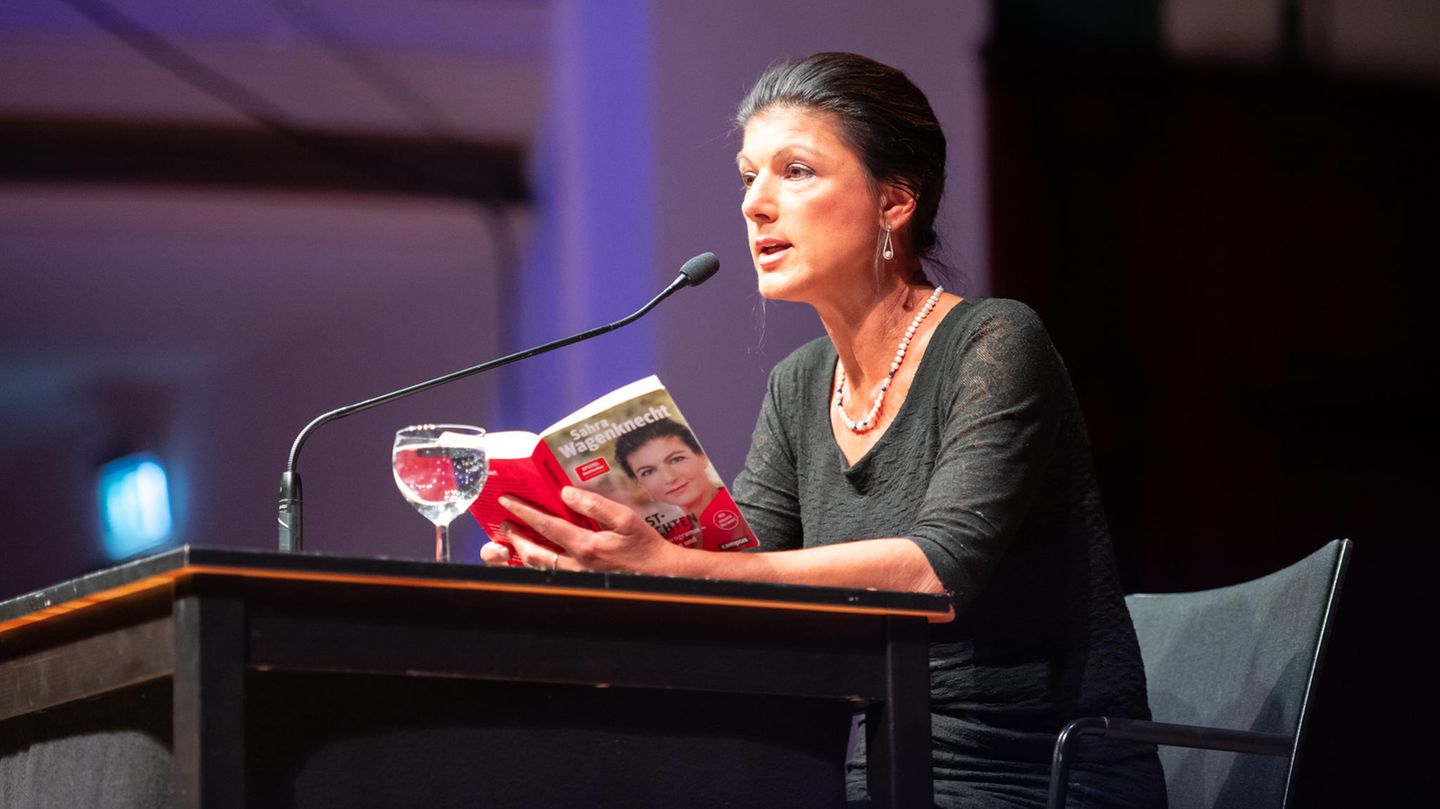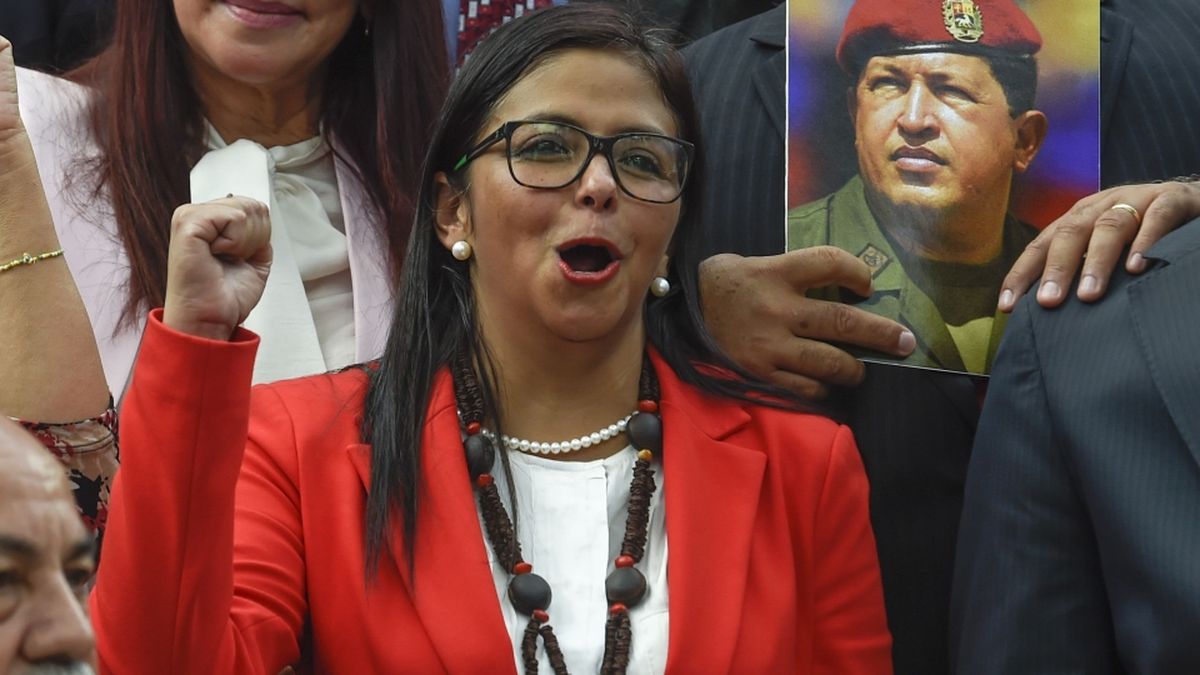She is now getting serious and wants to found a new party: At a reading in Halle, Sahra Wagenknecht takes a bath among her fans and explains parts of her plans. But when asked a question from the audience, she has to defend herself.
Two and a half years ago, a book by Sahra Wagenknecht was published. Some also say: a reckoning with the Left Party. On Thursday evening she, who is still a party member, is sitting in the Steintor variety theater in Halle (Saale), she wants to read from “The Self-Righteous”.
But this evening another topic arises. Wagenknecht knows this too. At the beginning of the event in one of Germany’s oldest variety theaters, she announced: First, she would read for 40 minutes. Afterwards there will be enough time to discuss current topics. One thing should concern many people, she says.
What Wagenknecht means: We now know that she is serious about founding her own party. This had long been suspected; the left-wing politician had publicly flirted with it. She will present her plans at the federal press conference on Monday. Only then can she give details. “Let’s share a little bit anyway,” says one of the two moderators, a Wagenknecht fan who has come out.
This reading is no longer just any reading. It is the first public appearance of the most prominent left-wing politician after this announcement, which will also lead to her leaving the party. How does Wagenknecht arrive with her plans?
Sahra Wagenknecht: “Because that means you still think a little bit”
There are a few seats available, there are still a few tickets available at the box office, but the hall is well filled. Wagenknecht is announced, the audience applauds, and almost a minute passes before she comes on stage. Cheers ring out when she is seen. She is already sitting at the table in the middle of the stage, wearing a light blue blazer, when the applause turns into rhythmic clapping. A smile flashes across Wagenknecht’s face.
Admittedly, it’s easy for them here. A woman in the front row says she traveled over a hundred kilometers from a town just before the Lower Saxony border. Only for Wagenknecht. A man in the back rows even came to Saxony-Anhalt from Freiburg im Breisgau. The person who announces Wagenknecht asks about this before the event as he walks through the rows. Otherwise there are many from Halle, some from Magdeburg.
“I’m pleased that so many of you showed up,” says Wagenknecht. The black curtains in the background are bathed in red light. “Because that means you have to think a little more. Because the way things are now, things can’t go any further.”
“That’s right,” says a visitor from her seat, nodding energetically. Applause breaks out.
There was always applause this evening. Wagenknecht decided to read from the foreword to the latest edition, which she wrote four months after the start of the war in Ukraine. Their message: There must be other ways to end conflicts than the military route. For them, a central reason for Russia’s attack is the country’s previous humiliation by the West. She attests that the government and large parts of society have a “belligerence”. Sentences that inevitably remind you of sounds from the AfD.
For her, everything fits into the picture – she presents herself as a fighter against a left-liberal camp that, in her opinion, is defined primarily by morality. In this way, being anti-Russian becomes a “perfect war against evil.” A different opinion is not accepted by the mainstream, she claims. This is also the case with migration issues, it was the case in the corona pandemic, and it is now also evident in the discussion about the Middle East conflict. “Differentiation is becoming less and less popular in our public debate,” sums up Wagenknecht. But often things are not black and white.
It is the transition to her new party, about which she is then asked by the two moderators. “There are many who no longer feel represented by any party,” says Wagenknecht. People would become more and more desperate without social problems being addressed. In addition, the current government is only making things worse. She doesn’t want to imagine where this will lead in the end. Many voted for the AfD out of anger, is Wagenknecht’s diagnosis. Among them are many “serious people” who need a “serious address” with “serious concepts”.
A visitor says: “I’ve been waiting eagerly for this”
The Left Party is not her political opponent, says its former parliamentary group leader, and she regrets their situation. But the party decided on a path that has now led to a lack of voter support. In recent years, Wagenknecht has repeatedly accused the Left of not representing the interests of voters with its focus on gender equality or sea rescue, for example – and thereby helping the AfD to gain momentum. Wagenknecht joined the SED in 1989 and was later a member of the PDS and the Left. From 2015 to 2019 she was parliamentary group leader.
In the reading in Halle, Wagenknecht repeatedly emphasizes social issues. For example, she doesn’t want to know about a question about her own stress: A carer has much more stress – and earns much less. She doesn’t want to complain about it herself. That also gets a lot of applause. According to a report in the “Bild” newspaper from mid-September, Wagenknecht’s own project focuses on four main areas: “economic reason”, “social justice”, “peace” and “freedom”.
“I’ve been waiting eagerly for this,” says a woman in the audience with the microphone in her hand. But she has one question: “Why is the new name based on Wagenknecht himself?” She doesn’t think that’s a good thing, says the woman.
Wagenknecht: “That won’t be the final name”
What she is referring to: An association that has already been founded in Wagenknecht’s environment and is intended to serve as a forerunner of the party has been entered into the association register under the name “BSW – For Reason and Justice eV”. Alliance Sahra Wagenknecht. The politician will become this association on Monday together with a draft political program.
It’s a little tricky for Wagenknecht, you can see that on her face. “That won’t be the final name,” she then says. She doesn’t need that for her vanity, but for a certain time people also have to “find” the party – “just on the ballot paper.” The name will therefore be that for a transitional period. “But not in the long term, I can reassure you,” says Wagenknecht.
The question puts a finger in the wound: Sahra Wagenknecht is the prominent face, the driving force. But she also needs the others. The “Get Up” movement she launched in 2019, which was intended to unite the left-wing camp, showed this – the project had failed resoundingly.
Wagenknecht seems to have learned from this: She apologizes to the audience for the fact that it took “so long” for it to finally become concrete. But it’s about building structures first. “If you do it, you have to do it in such a way that it can be a success,” she says. “And I hope so now.”
Source: Stern
I have been working in the news industry for over 6 years, first as a reporter and now as an editor. I have covered politics extensively, and my work has appeared in major newspapers and online news outlets around the world. In addition to my writing, I also contribute regularly to 24 Hours World.




